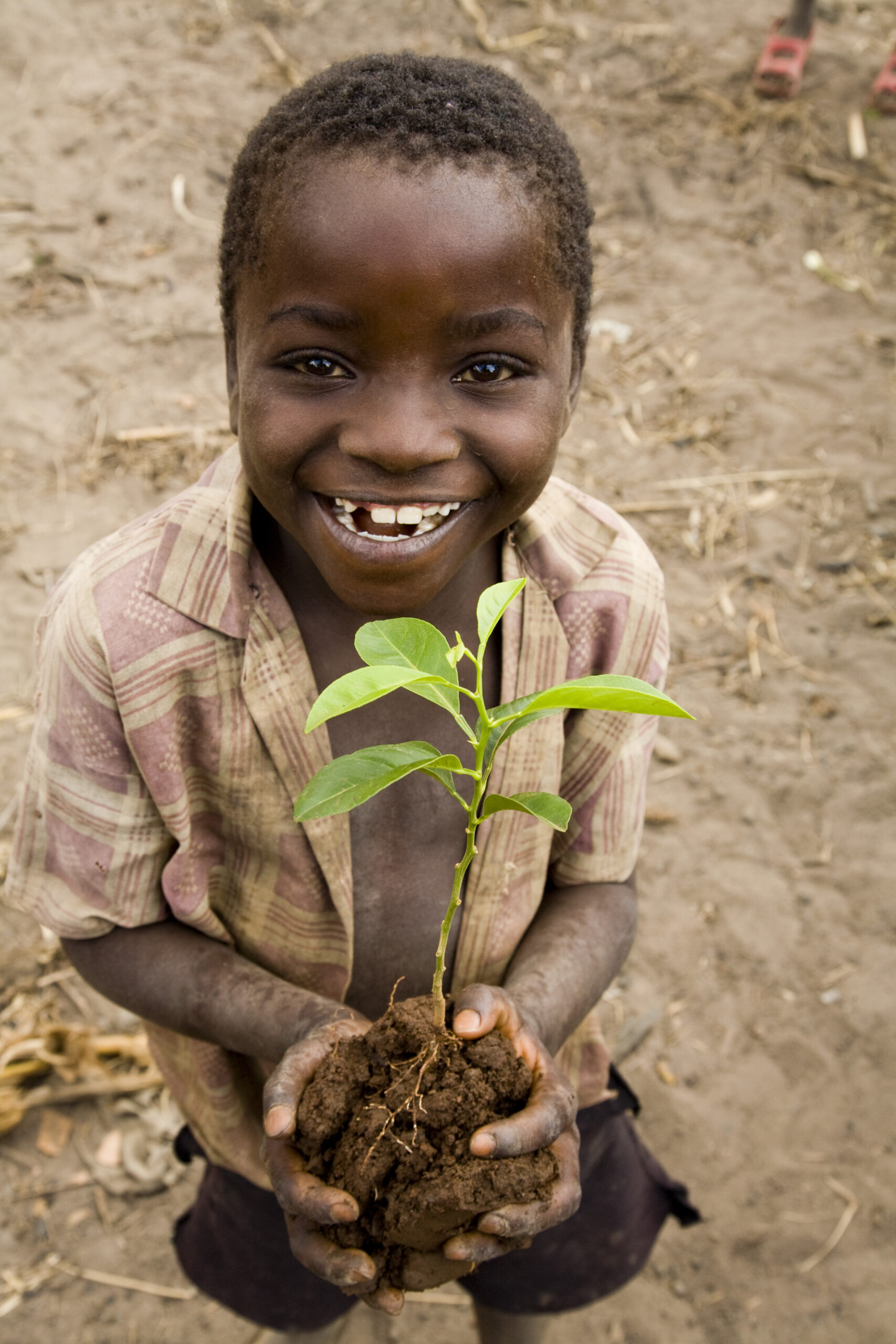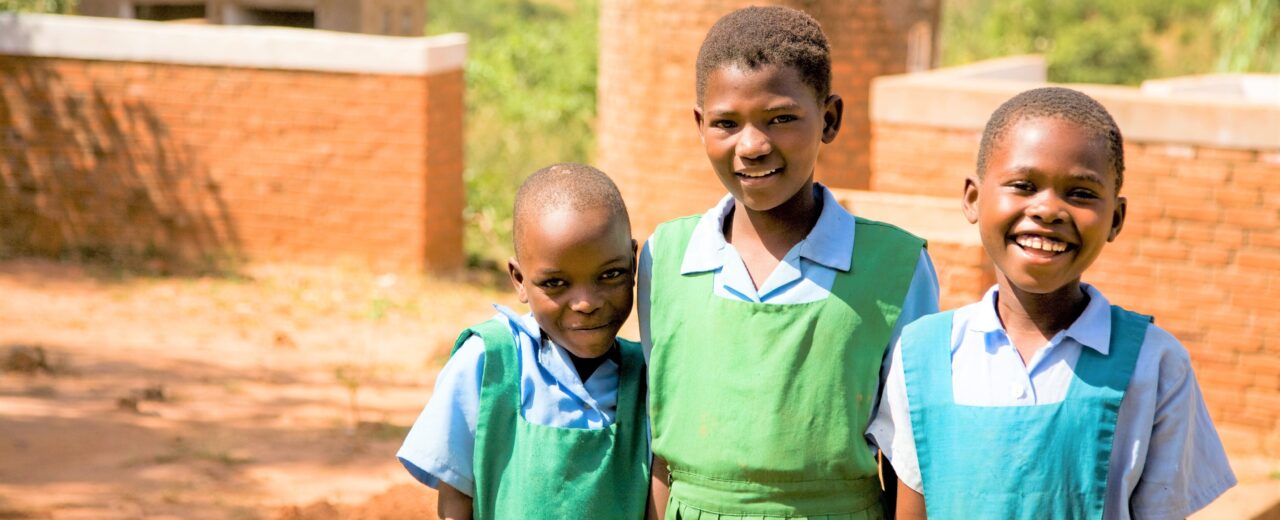 Food Security for Children in Rural Malawi
Food Security for Children in Rural Malawi
Fruit Trees for Malnourished Schoolchildren in Lilongwe District
The impact of having a school garden program in rural Malawi is multi-faceted. Students learn how to grow food in a harsh climate of alternating drought and rains – knowledge that will help to immediately provide food for themselves, their families, their fellow community members, and their future families. They learn how to improve soil quality through non-chemical interventions – helping to reintroduce vital nutrients to the soil and bringing vegetative cover to once desolate areas. The students transfer knowledge to younger students and community farmer groups – helping to create home-based gardens and improve larger communal gardens. The gardens also create revenue streams for schools when they sell fruit and vegetables to their community, which yields funds to be invested further in the gardens, feeding disadvantaged children, buying school supplies and/or paying tuition fees.
Necessity
Fresh, nutritious food needed for students in Malawi
Activity
Provision of fruit tree seeds for schoolchildren in rural Malawi
Countable effort
Every GOOD DEED will contribute to 1 fruit tree planted to provide food security for a child in Lilongwe District.
Result
Help to provide nutritious food for thousands of students in Malawi
Systemic effect
Helping to improve the health, educational outcomes, and well-being of children in developing countries
Background
This GOOD DEED addresses the desperate need for food security and improved nutrition in the Lilongwe District of Central Malawi. Malawi is experiencing climate uncertainty (droughts, floods, mudslides and hurricanes), leading to damaged infrastructure, contaminated water sources, irrigation problems, and a decrease in crop production [World Bank Group, 2022]. Abject poverty and recurrent climate shocks, as well as economic decline, including the effects of the war in Ukraine on market prices, have all contributed to approximately 5.4 million people in rural and secondary urban centers facing Moderate or Severe chronic food insecurity [IPC Chronic Food Insecurity Report, 2022 and 2023]. More than 2.8 million people (15% of the total population) are experiencing high acute food insecurity [IPC, 2023]. School absenteeism, especially for female students, also remains a challenge, with the country’s primary school completion rate at 56% in 2022 [UNICEF, 2022]. Only 42% of children transitioned from primary to secondary school in 2022, and 17.9% of female students actually completed secondary school [Ibid.]. Thus, immediate measures need to be taken to protect livelihoods and reduce food consumption gaps. This GOOD DEED aims to achieve food security for primary schoolchildren, improve nutritional habits, build community resilience to adverse climate hazards, improve school retention rates, and provide vital permaculture skills that will benefit current and future generations.
The good deed
This GOOD DEED will support the procurement of fruit tree seeds to improve food security, nutritional and educational outcomes for students in Malawi. The program is multi-dimensional, and aligns with CPAR’s mission to strengthen health systems and outcomes in low-resourced, rural communities in Africa. The target area in Lilongwe District has a humid, sub-tropical climate with a long, hot dry season that lasts for about 8 months of the year. This brings a dire need for enhanced permaculture skills, knowledge, and tools to create sustainable food sources. Many communities are unaware of improved conservation agricultural practices, which can mitigate the effects of climate change and result in more consistent production of nutritious foods. Through various permaculture activities, including the provision of fruit tree seeds and gardening tools, this program will help primary school students to create plentiful gardens, ultimately providing access to nutritious food.
Challenge
This GOOD DEED will support the procurement of fruit tree seeds to improve food security and nutritional outcomes for students in Malawi. The GSN is a multi-dimensional program, which aligns with CPAR’s mission to strengthen health systems and outcomes in low-resourced, rural communities in Africa. The target area has a humid, sub-tropical climate with a long, hot dry season that lasts for about 8 months of the year. This brings a dire need for other sources of water for irrigation farming during these months. Many communities are unaware of improved conservation agricultural practices (such as soil water harvesting practices to store rainwater and promote ground water collection), which can mitigate the effects of climate change and result in more consistent production of nutritious foods. The GSN program has grown to include access to essential services, including water and sanitation, as well as menstrual hygiene management training and materials, WASH and permaculture educational training, and the provision of gardening tools and seeds. There are now 13 primary schools supported by the GSN in Malawi. The impact of having a school garden program is multi-faceted. Students learn how to grow fruits and vegetables in a harsh climate of alternating drought and rains – knowledge that will help to immediately provide for themselves, their families, their fellow community members, and their future families. They learn how to improve soil quality through non-chemical interventions – helping to reintroduce vital nutrients to the soil and bringing vegetation to once desolate areas. The students transfer knowledge to younger students and community members – helping to create home-based gardens and improve larger communal gardens. The gardens also create revenue streams for schools when they sell fruit and vegetables to their community, which yields funds to be invested further in the gardens, buying school supplies and/or paying tuition fees.

About Lilongwe District, Central Malawi
Capital of Malawi
Lilonge
Lilonge District
1,333,000
population
4.47% increase from 2023
GDP per capita
2,325 CAD$
ranking 184th of 190 countries
HDI 0,508
ranking 172nd of 193 countries
(2024)
Malawi is affectionately known as “The Warm Heart of Africa” due to the kind and hospitable nature of its inhabitants. Malawi was the first country in Africa to grow tea on a commercial scale.
About the organization and further information

Canadian Physicians for Aid and Relief
Website
Further information and source
- • IPC-2022, International Code Council, 2022. Malawi: Chronic Food Insecurity Situation 2022 - 2026. Published May 20, 2022.
- • IPC-2023, International Code Council, 2023. Malawi: Acute Food Insecurity Situation for July - September 2023 and Projection for October 2023 - March 2024. Published August 18, 2023.
- • World Bank. "Country: Malawi." World Development Indicators, The World Bank Group, 2021.
- • UNICEF. Country Office Annual Report, Malawi. UNICEF. 2022. Pg. 1-7.
- • World Food Programme. WFP Malawi Country Brief. World Food Programme. Published February 2024.




